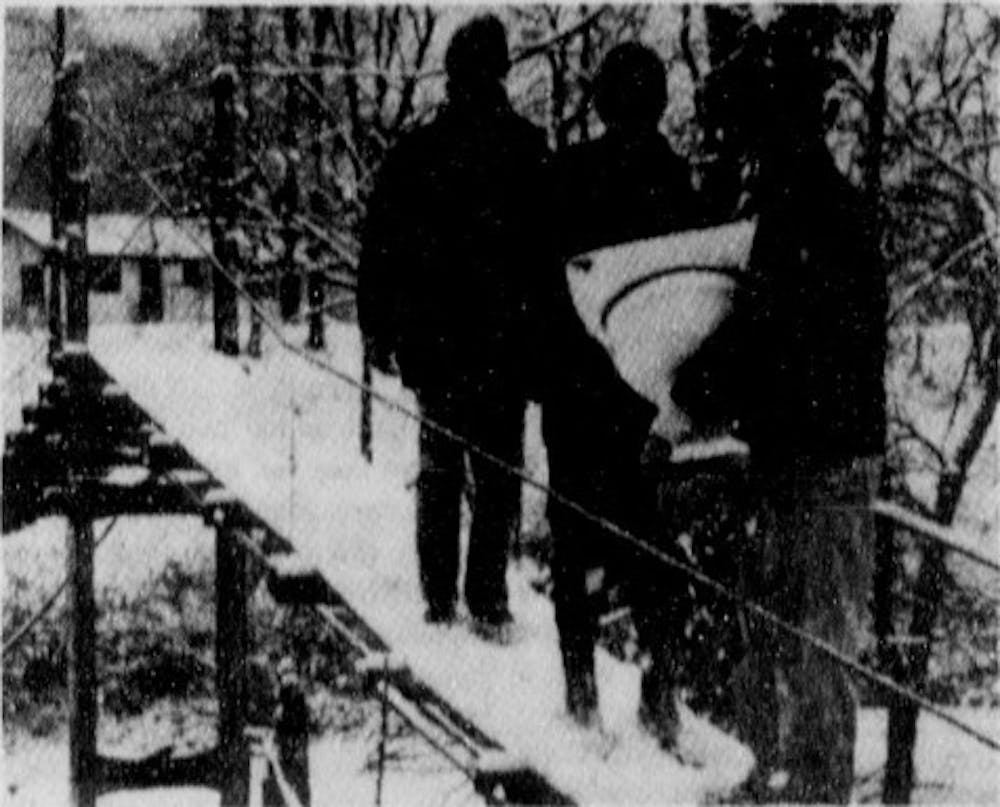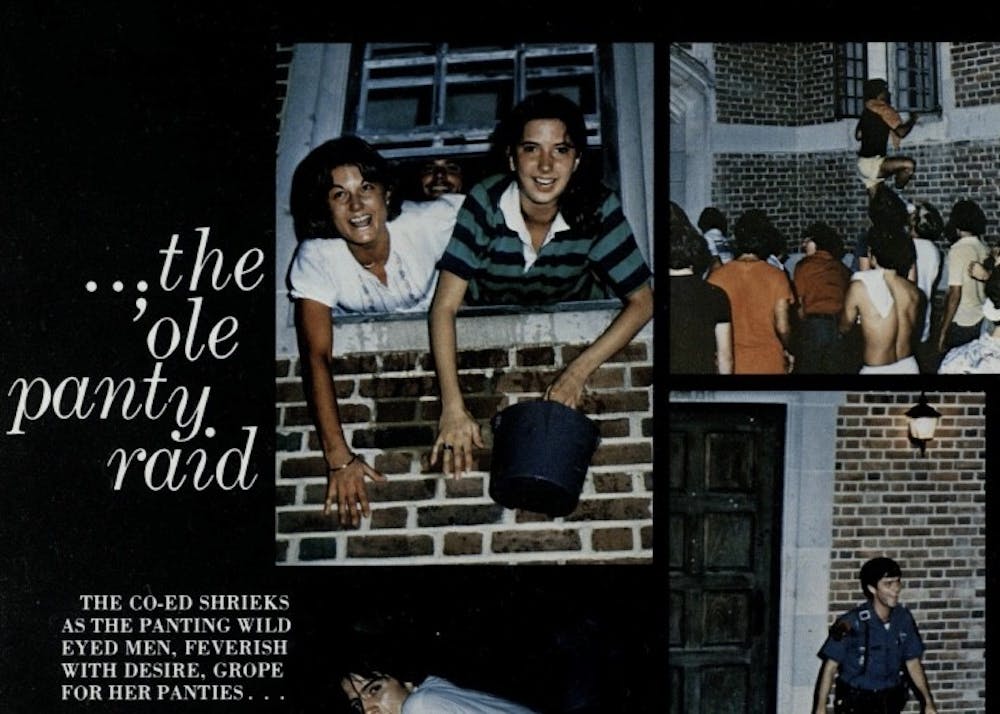We’ve seen it all before: the romantic scene where a gentleman stands below a woman’s bedside window confessing his love. Prince Charming calling for Rapunzel. Romeo bellowing for Juliet.
At the University of Richmond, Richmond College students stood outside Westhampton College dormitories crying for undergarments. The Panty Raid, a tradition where Westhampton women threw their panties to men from their dorm windows, was an annual affair implemented by UR students in the 1950s.
“Mid the pines of Richmond hills Wednesday night the cry of ‘We want panties’ rang from the shrill voices of some 150 male students as the first panty raid in the 122 year history of the University came off in grand style,” said a Collegian writer in May, 1952.
Panty raids, among other traditions, are something that many current UR students are not aware actually happened, said senior Catherine Franceski, a School of the Arts and Sciences 2018 summer fellow for the Race and Racism Project at UR. Franceski said she had researched the panty raids primarily through studying The Web yearbooks.
“There is an interesting relic of UR history,” she said. “I got to see year by year how the traditions came and transformed over time. Each yearbook was a little piece of the larger puzzle that shined a light.”
Franceski’s research on panty raids focused on the role gender played within the tradition.
“Some years, the girls participated in it just as much as the guys; they were the ones throwing down their panties,” Franceski said. “Some Westhampton women called it funny and light-hearted and a break from the monotony of campus.”
Betty Ann Dillon, '49, said that UR's culture reflected campus demographics in the 20th century.
“By the end of World War Two, the GI Bill kicked in and then there were 3.5 men to every woman on campus,” Dillon said. “We said, ‘The half was married, but the other three were fair game.’ We had a good time.”
Dillon also emphasized that this tradition was not exclusive to UR.
“The panty raids were all over the country,” she said. “It was a different culture back then.”
Franceski said she thought that UR’s panty raids had represented toxic masculinity: a depiction of manhood defined by violence, sex, status and aggression.
“Other years, the men bust into the dorms, tore apart furniture and really disrupted the girls' dormitory by causing a flood, and stealing undergarments,” Franceski said. “Also, they would go into women’s unlocked rooms and were really scaring them.
“The panty raids created an atmosphere where men intruded women’s space and made them almost victims of crimes by coming into their space and taking their stuff.”
Enjoy what you're reading?
Signup for our newsletter

"Three Participants in the panty raid return to Richmond College with their booty: a toilet from Gray Court." Source: The Collegian archives, March 31, 1983.
In the years 1976 and 1982, there had been documented incidents of excessive water damage in Gray Court, a women’s-only dormitory.
“It was a time of restlessness, I would say, where male students had long hair, which expressed their temperament somewhat,” said E. Bruce Heilman, university president from 1971-1986. “The men were rambunctious and rowdy. They were almost uncontrollable.”
Heilman said that the separation between Richmond and Westhampton College before his presidency attributed to this behavior.
“UR clearly, in the minds of our constituency, was somewhat separated, with an institution for women on one side and an institution for men on the other side,” he said. “We had a coordinate college, but it was really a college for women and a college for men. We had separate food services. Health facilities. Severed admissions offices. Everything was separate.”
Before Tyler Haynes Commons was built in 1976, there was a road, Heilman said. A gate in the middle of the road separated Westhampton College and Richmond College, and it would lock at 10 p.m. every night.
“The men would march on the president’s home in the evening, protesting not being able to go to the girls’ dormitories,” Heilman said. “When you put men with women, they become somewhat civilized. When they are by themselves, they’re terrible.”
Panty raids is a tradition that has not occurred at UR since the late 20th century, said Irina Rogova, Race and Racism at UR project archivist.
“It’s just one of those traditions where in our own modern perspective we’re deeply uncomfortable with it,” Rogova said. “I always think about who was deeply uncomfortable at that time.”
Rogova said it was important to acknowledge that not everyone had participated in this tradition.
“It’s not like everyone wanted to be a part of it,” she said. “But their voices were often silenced. Whose voices are we not hearing in these representations of university history?”
Not everyone had the capacity to contribute to panty raids, Rogova said.
“I would find it difficult to find a non-white male participating in a panty raid back in the day,” she said. “I think they would’ve felt unsafe participating in that. I think that also talks to a larger structure of who is allowed to do things on this campus and these traditions.”
It is unclear when the panty-raid tradition ended. However, a 1999 Collegian article indicates that any student participating in a panty raid would be expelled by that point in time.
Contact international editor Olivia Diaz at olivia.diaz@richmond.edu.
Support independent student media
You can make a tax-deductible donation by clicking the button below, which takes you to our secure PayPal account. The page is set up to receive contributions in whatever amount you designate. We look forward to using the money we raise to further our mission of providing honest and accurate information to students, faculty, staff, alumni and others in the general public.
Donate Now



